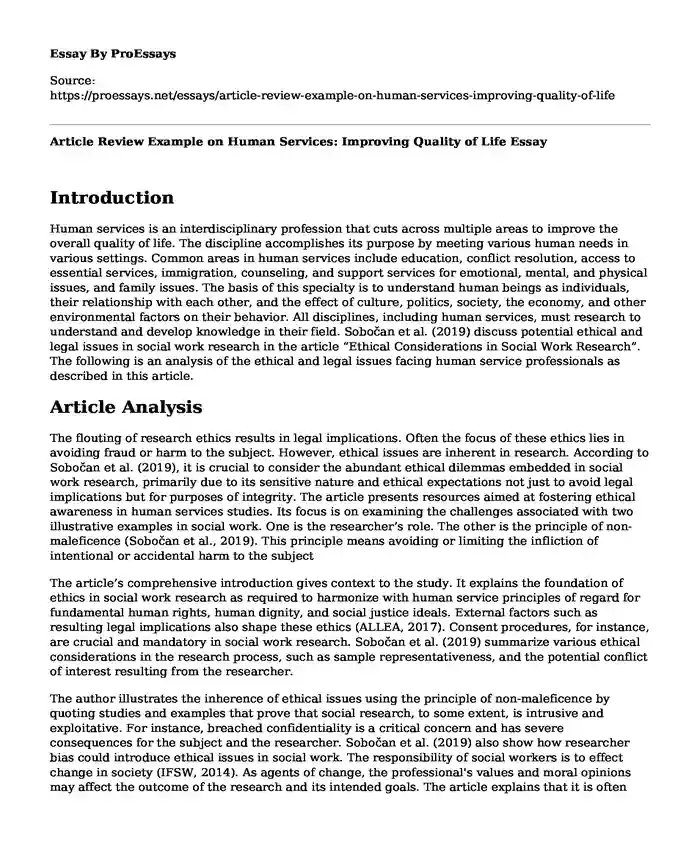Introduction
Human services is an interdisciplinary profession that cuts across multiple areas to improve the overall quality of life. The discipline accomplishes its purpose by meeting various human needs in various settings. Common areas in human services include education, conflict resolution, access to essential services, immigration, counseling, and support services for emotional, mental, and physical issues, and family issues. The basis of this specialty is to understand human beings as individuals, their relationship with each other, and the effect of culture, politics, society, the economy, and other environmental factors on their behavior. All disciplines, including human services, must research to understand and develop knowledge in their field. Sobocan et al. (2019) discuss potential ethical and legal issues in social work research in the article “Ethical Considerations in Social Work Research”. The following is an analysis of the ethical and legal issues facing human service professionals as described in this article.
Article Analysis
The flouting of research ethics results in legal implications. Often the focus of these ethics lies in avoiding fraud or harm to the subject. However, ethical issues are inherent in research. According to Sobocan et al. (2019), it is crucial to consider the abundant ethical dilemmas embedded in social work research, primarily due to its sensitive nature and ethical expectations not just to avoid legal implications but for purposes of integrity. The article presents resources aimed at fostering ethical awareness in human services studies. Its focus is on examining the challenges associated with two illustrative examples in social work. One is the researcher’s role. The other is the principle of non-maleficence (Sobocan et al., 2019). This principle means avoiding or limiting the infliction of intentional or accidental harm to the subject
The article’s comprehensive introduction gives context to the study. It explains the foundation of ethics in social work research as required to harmonize with human service principles of regard for fundamental human rights, human dignity, and social justice ideals. External factors such as resulting legal implications also shape these ethics (ALLEA, 2017). Consent procedures, for instance, are crucial and mandatory in social work research. Sobocan et al. (2019) summarize various ethical considerations in the research process, such as sample representativeness, and the potential conflict of interest resulting from the researcher.
The author illustrates the inherence of ethical issues using the principle of non-maleficence by quoting studies and examples that prove that social research, to some extent, is intrusive and exploitative. For instance, breached confidentiality is a critical concern and has severe consequences for the subject and the researcher. Sobocan et al. (2019) also show how researcher bias could introduce ethical issues in social work. The responsibility of social workers is to effect change in society (IFSW, 2014). As agents of change, the professional's values and moral opinions may affect the outcome of the research and its intended goals. The article explains that it is often difficult for social work research to be non-political. The resulting side effects may be a positive social change, or they may create a backlash and negatively affect the subjects (Sobocan et al., 2019). Although it is hard to define the outcome, ethics demand that researchers consider such unintended consequences and the potential use of research to effect social change.
Sobocan et al. (2019) conclude that an appropriate solution to handle the numerous intrinsic research ethics issues in social work is to expand the researcher’s capacity to consider them. Doing so requires the involvement of support from the human services (social work) and research fields. The article recommends regular case studies, and discussions focused on ethics in human services, professional meetings, and academic journals. It suggests that journals and sources of funding guarantee ethically sound research, for instance, by incorporating values and ethics in the publication or funding eligibility guidelines.
Conclusion
In my opinion, this article reveals a crucial ethical aspect of the human services profession with significant potential legal implications. Its focus is on social work researchers and the challenges they face in terms of research ethics. The data is informative and precise, and the recommendations seem practical. The author also provides instances where the recommended practices are in practice. However, a possible counterargument is that these ethical issues may be so broad that it may be difficult for the researcher, despite capacity building, to consider them all.
References
ALLEA. (2017). European code of conduct for research integrity: Revised edition. Berlin: ALLEA - All European Academies.
IFSW. (2014). Global definition of social work. Retrieved from International Federation of Social Workers: https://www.ifsw.org/what-is-social-work/global-definition-of-social-work/
Sobocan, A. M., Bertotti, T., & Strom-Gottfried, K. (2019). Ethical considerations in social work research. European Journal of Social Work, 22(5), 805-818. doi:10.1080/13691457.2018.1544117
Cite this page
Article Review Example on Human Services: Improving Quality of Life. (2023, Nov 18). Retrieved from https://proessays.net/essays/article-review-example-on-human-services-improving-quality-of-life
If you are the original author of this essay and no longer wish to have it published on the ProEssays website, please click below to request its removal:
- Historic Epidemiological Event: Ebola Virus Disease
- Essay Example: Refugees Freedom of Movement as a Human Right
- Paper Example on Organ Transplantation
- Essay Sample on Crime in New York Between 1850 and 1950
- Socrates' Defense of Justice - Essay Sample
- Essay on Health Care Emergency Preparedness: A Hospital Emergency Manager's Role
- The Epic Tales of David & Goliath & The Odyssey - Essay Example







